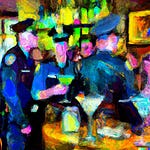Dear readers,
Due to the holiday weekend, this week’s schedule for Very Serious is out of order. The podcast is out today, there will be a regular issue tomorrow, and a special Fire Island edition of the Mayonnaise Clinic will be coming on Friday.
One striking fact about three-term New York mayor Ed Koch’s life in the closet — the subject of a recent New York Times feature — is that he stayed in the closet long after he could plausibly claim that he needed to.
An openly gay man would not have been elected mayor of New York City in 1977; once in office, he would have had good reason to fear he would not have been re-elected had he come out. Politicians simply didn't do that at the time. But in retirement, Koch had no reputation to protect from the knowledge that he was gay. In fact, coming out probably would have earned him sympathetic news coverage and softened his image at a time when his record as mayor was often criticized for reasons related to race relations and the AIDS crisis — including the specific allegation that he shied away from leadership on AIDS for fear that association with a “gay issue” would fan the (true) rumors that he was gay.
One theory the Times piece considers is that, after denying his sexuality for so many years in the face of detractors like Larry Kramer who wanted him outed, Koch felt coming out would be tantamount to letting them win. But if you lie about your sexuality long enough, it can simply become hard to tell the truth. A lot of people stay in the closet for expediency, but a lot of people stay there because of their own shame, and it’s sad.
And it’s sad how common the need to hide was until not very long ago.
This week’s episode of the Very Serious podcast is an interview with James Kirchick, author of the new book Secret City: The Hidden History of Gay Washington, which chronicles the powerful roles that gays (mostly gay men) played in our federal government from World War II through the Reagan administration. Just because gays couldn’t announce themselves didn't mean they weren't around — in fact, some of them arguably sublimated their sexual desires into drive that propelled them to the heights they achieved in American government.
Jamie’s book describes the creation of the modern closet as an artifact of World War II, the Cold War, and the security state. Gays had long been considered disgusting, but with world war they came to be considered security threats, at risk of blackmail over their appalling secrets. As a concept, that this would be a risk makes intuitive sense, though Jamie notes the surprising difficulty American officials had when asked to identify any specific cases where gays in government were blackmailed over their sexual orientation. And besides, whatever security risk homosexuals posed was not really a product of their sexual orientation itself, but of the government’s and society’s reaction to their sexual orientation — if you let people freely admit they are gay, then there’s no shameful secret to threaten anyone over. Nonetheless, gays were vilified, investigated, and until 1995, prohibited from holding security clearances.
Through the decades covered in Jamie’s book, allegations of homosexuality were wielded as political weapons — true allegations and also false ones. Jack Kemp, for example, was not gay, and he was definitely not part of a right-wing gay cabal that controlled Ronald Reagan. But that didn’t stop a cadre of Republican officials — many of them moderates — from pushing that fantastical narrative to reporters in an effort to block Reagan's nomination in 1980. That madcap story is the subject of an excerpt from Jamie’s book that you can read in Politico Magazine.
The 1980s would bring in the AIDS crisis, and an aloof response to it from the Reagans, despite Nancy Reagan’s coterie of gays, ranging from her hairdresser1 to Merv Griffin. The AIDS crisis would also lead to the waning of the political closet as it had been established in the 1940s, with gay political figures forced out of it, often in death. The era also brought the first two openly gay congressmen who sought and attained re-election: Gerry Studds and Barney Frank, both from Massachusetts, and both far from the idealized image of a gay politician you might mold on the basis of a focus group.2
I encourage you to listen to the podcast and, if it intrigues you, read the book. It's dishy and full of odd stories like the one about Reagan and the alleged secret right-wing gay cabal; and of correctives to wrong things you’ve likely heard about figures such as J. Edgar Hoover, who probably was not actually a cross-dresser. The story as a whole is sad and maddening — Jamie has, for example, handwritten edits to Ronald Reagan’s draft statement about Rock Hudson’s death, removing all reference to the closeness of Hudson’s relationship to Ronald and Nancy — but also very interesting, and well worth your time.
Very seriously,
Josh
P.S. As we’ve mentioned, the Very Serious podcast is now hosted directly on Substack, coming to you through the same series of tubes as the newsletter. We think the migration has been pretty seamless — if you already subscribed to the podcast, it should still be coming into your player of choice just like before; and if you want to sign up now, we have a button here for you to press.
We are now offering episode transcripts. You can see this episode’s transcript here.
Questions about the process? Technical issues with your feed? Email podcasting@substackinc.com for support. For any other inquiries, please email mayo@joshbarro.com.
Nancy Reagan’s hairdresser, Robin Weir, died in 1993 at the age of 45. His cause of death was described as “a worsening of colitis, bacteria sepsis and a heart attack” in a statement to the Los Angeles Times.
Studds survived not just being outed as gay but being outed as having had an affair with a male 17-year-old congressional page — a pretty remarkable thing for the voters to have forgiven as early as 1984. But then, it was Massachusetts, and Ted Kennedy wasn’t even punished for killing a woman, so.











